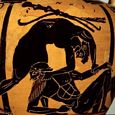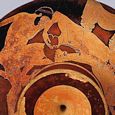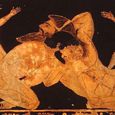ANTAIOS
Greek Name
Ανταιος
Transliteration
Antaios
Latin Spelling
Antaeus
Translation
Set-Against, Hostile
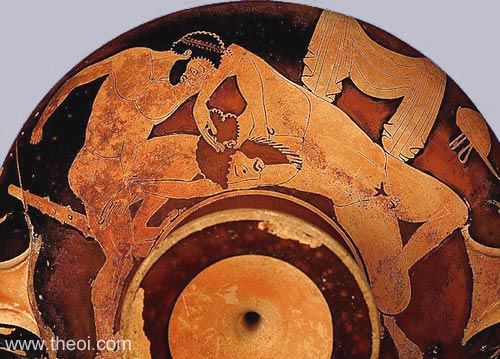
ANTAIOS (Antaeus) was a Libyan giant who forced travellers passing through his land to compete with him in a wrestling match. He overwhelmed them all and used their skulls to roof the temple of his father Poseidon.
Antaios was a son of Gaia of the Earth, and it was from her that he drew his invincible strength. When Herakles encountered him in the ring, Athene advised the him to lift the giant up from the earth in the contest. He did so, and weakening the monster was able to crush his ribs and kill him.
The Greek word antaios which lies behind his name means "set-against" or "hostile."
FAMILY OF ANTAEUS
PARENTS
[1.1] POSEIDON & GAIA (Apollodoros 2.115)
[1.2] GAIA (Philostratus Elder 2.21, Hyginus
Fabulae 31)
OFFSPRING
[1.1] A DAUGHTER (Pindar Pythian 9 str5)
ENCYCLOPEDIA
ANTAEUS (Antaios). 1. A son of Poseidon and Ge, a mighty giant and wrestler in Libya, whose strength was invincible so long as he remained in contact with his mother earth. The strangers who came to his country were compelled to wrestle with him; the conquered were slain, and out of their skulls he built a house to Poseidon. Heracles discovered the source of his strength, lifted him up from the earth, and crushed him in the air. (Apollod. ii. 5. § 11; Hygin. Fab. 31 ; Diod. iv. 17; Pind. Isthm. iv. 87, &c.; Lucan, Pharsal. iv. 590, &c.; Juven. iii. 89; Ov. Ib. 397.) The tomb of Antaeus (Antaei collis), which formed a moderate hill in the shape of a man stretched out at full length, was shewn near the town of Tingis in Mauretania down to a late period (Strab. xvii. p. 829; P. Mela, iii 10. § 35, &c.), and it was believed that whenever a portion of the earth covering it was taken away, it rained until the hole was filled up again. Sertorius is said to have opened the grave, but when he found the skeleton of sixty cubits in length, he was struck with horror and had it covered again immediately. (Strab. l. c.; Plut. Sertor. 9.)
2. A king of Irasa, a town in the territory of Cyrene, who was sometimes identified by the ancients with the giant Antaeus. He had a daughter Alceis or Barce, whom he promised to him who should conquer in the foot race. The prize was won by Alexidamus. (Pind. Pyti. ix. 183, &c., with the Schol.)
Source: Dictionary of Greek and Roman Biography and Mythology.
CLASSICAL LITERATURE QUOTES
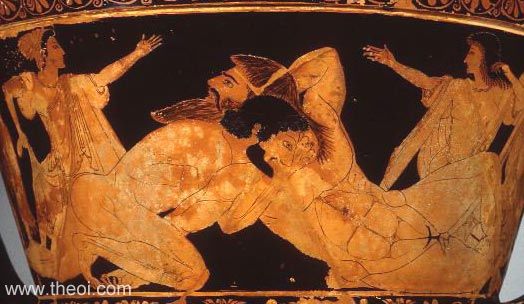
Pindar, Isthmian Ode 4 ep 3 (trans. Conway) (Greek lyric C5th B.C.) :
"To the house of Antaios (Antaeus) there came a hero from Thebes of Kadmos' (Cadmus') race [Herakles
(Heracles)], to Libya's corn-lands, small in his body's height but of soul indomitable, bringing a wrestler's
grip to stay him who crowned with skulls of strangers Poseidon's holy shrine."
Pindar, Pythian Ode 9 str5 - ep5 :
"The tale, how for a Libyan bride they [Alexidamos and his companions] rode to the city of Irasa, to seek
the hand of Antaios' (Antaeus') glorious daughter, maid of the lovely hair. Many a gallant chief of men of her
own kin, and many a stranger sought her to be his bride, for indeed her beauty was wonderful to behold.
And much they longed to cull the ripened fruit of Youth's fair vision, golden-crowned. But planning for his
child a yet more glorious marriage, her father called to mind the story how Danaus long ago achieved in Argos
for eight and forty daughters, before the noon of day, the speediest of marriage. For he set all the gathered
company there at the finish of the race-course, and proclaimed that all the heroes who were come to be his
daughter's suitors, must decide by trial of their speed of foot, which maid for each should be his bride.
So too the Libyan king, to a groom thus chosen offered his daughter's hand. And at the line he set her, adorned
in all her fair array to be the goal and final prize; and declared to them all : ‘That man who first,
leading the field, shall touch the maiden's robes, shall take her for his bride.’ Then down the course
swiftest of all, Alexidamos, raced to his prize, the noble maid, and through the ranks of Nomad horsemen led her
by hand."
Plato, Laws 796a (trans. Lamb) (Greek philosopher C4th B.C.) :
"The devices introduced by Antaios (Antaeus) or Kerkyon (Cercyon) in the art of wrestling for the sake of
empty glory." [N.B. Mythical wrestlers to whom were ascribed such devices as the use of the legs in
wrestling.]
Plato, Theaetetus 169b :
"[Plato uses the figure of Antaios as a metaphor :]
Theaetetos (Theaetetus) : You seem to me to play rather the role of Antaios (Antaeus); for you do not let anyone
go who approaches you until you have forced him to strip and wrestle with you in argument.
Sokrates (Socrates) : Your comparison with . . . Antaios pictures my complaint admirably; only I am a more
stubborn combatant than they; for many a Herakles (Heracles) . . . strong men of words, have fallen in with me
and belabored me mightily."
Pseudo-Apollodorus, Bibliotheca 2. 115 (trans. Aldrich) (Greek mythographer C2nd
A.D.) :
"He [Herakles] proceeded through Libya, which was ruled by Poseidon's son Antaios (Antaeus), who forced
strangers to wrestle and then killed them. When Herakles was forced, he clasped Antaios in his arms, lifted him
into the air, weakened him and killed him. For it happened that Antaios was stronger when his feet were on the
ground, which is why some said he was a son of Ge (Gaea, the Earth)."
Quintus Smyrnaeus, Fall of Troy 4. 436 ff (trans. Way) (Greek epic C4th A.D.)
:
"Forthwith a bar of iron massy and long from the swift-speeding hand did many essay to hurl; but not an
Argive could prevail to cast that ponderous mass. Aias alone sped it from his strong hand . . . and all men
marvelled to behold how far flew from his hand the bronze which scarce two men hard-straining had uplifted from
the ground. Even this Antaios'(Antaeus') might was wont to hurl erstwhile, ere the strong hands of Herakles
o'ermastered him. This, with much spoil beside, Herakles took, and kept it to make sport for his invincible
hand; but afterward gave it to valiant Peleus, who with him had smitten fair-towered Ilios's burg renowned; and
he to Akhilleus (Achilles) gave it."
Quintus Smyrnaeus, Fall of Troy 6. 286 :
"[Amongst the scenes depicted on the shield of Herakles' son Eurypylos :] There withal was wrought Antaios'
(Antaeus) brawny strength, who challenged him to wrestling-strife; he in those sinewy arms raised high above the
earth, was crushed to death."
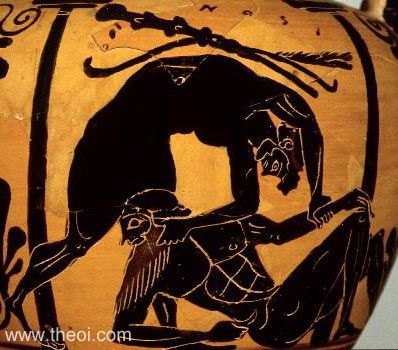
Diodorus Siculus, Library of History 4. 17. 4 (trans. Oldfather) (Greek historian
C1st B.C.) :
"Setting sail then, from Krete (Crete), Herakles put in at Libya, and first of all challenged to a fight
Antaios (Antaeus), whose fame was noised abroad because of his strength of body and his skill in wrestling, and
because he was wont to put to death all strangers whom he had defeated in wrestling, and grappling with him
Herakles slew the giant."
Plutarch, Life of Theseus 11. 1 (trans. Perrin) (Greek historian C1st to C2nd A.D.)
:
"Herakles. That hero punished those who offered him violence in the manner in which they had plotted to
serve him, and therefore sacrificed Bousiris (Busiris), wrestled Antaios (Antaeus) to death, slew Kyknos
(Cycnus) in single combat, and killed Termeros (Termerus) by dashing in his skull."
Philostratus the Elder, Imagines 2. 21 (trans. Fairbanks) (Greek rhetorician C3rd
A.D.) :
"[Description of an ancient Greek painting at Neapolis (Naples) :] Antaios (Antaeus). Fine sand, like that
found in the famous wrestling places, hard by a fountain of oil, two athletes, one of whom is binding up his
ears and the other removing a lion's skin from his shoulder, funeral mounds and monuments and incised
letters--this is Libya, and Antaios whom Ge (Gaea, the Earth) bore to do mischief to strangers by practicing, I
fancy, a piratical style of wrestling. To the giant who undertook these contests and buried those he slew in the
wrestling ground itself, as you see, the painting brings Herakles; he has already secured the golden apples here
shown and has won renown for his exploit among the Hesperides . . . Without even bending the knee, as the saying
is, he strips to meet Antaios, while yet breathing heavily from his journey; his eyes are intent upon some
purpose, as if in contemplation of the contest; and he has put a curb upon his anger that it may not carry him
beyond the bounds of prudence. But Antaios, disdainful and puffed with pride, seems to say to Heracles,
‘Ye children of wretched men,’ or some such thing, confirming his own courage by his insolence.
If Herakles had been devoted to wrestling, his natural characteristics would not have been different from those
represented in the painting; for he is represented as strong, and, in that his body is so symmetrically
developed, as abundantly endowed with skill; he might even be a giant and of a stature surpassing man's. He is
red-blooded, and his veins seem to be in travail as though some passion had stolen into them. As for Antaios, I
think you must be afraid of him, my boy; for he resembles some wild beast, being almost as broad as he is tall,
and his neck is attached to the shoulders in such wise that most of the latter belongs to the neck, and the arm
is as big around as are the shoulders. Yonder breast and belly that are ‘wrought with the hammer’
and the fact that the lower leg is not straight but ungainly mark Antaios as strong, indeed, but muscle-bound
and lacking in skill. Furthermore, Antaios is black, dyed by exposure to the sun. Such are the qualifications of
the two for the wrestling-match.
You see them engaged in wrestling, or rather at the conclusion of their bout, and Herakles at the moment of
victory. But he lays his opponent low at a distance above the earth, for Ge (Earth) was helping Antaios in the
struggle by arching herself up and heaving him up to his feet again whenever he was thrust down. So Herakles, at
a loss how to deal with Ge (Earth), has caught Antaios by the middle just above the waist, where the ribs are,
and set him upright on his thigh, still gripping his arms about him; then pressing his own fore-arm against the
pit of Antaios' stomach, now flabby and panting, he squeezes out his breath and slays him by forcing the points
of his ribs into his liver. Doubtless you see Antaios groaning and looking to Ge (Earth), who does not help him,
while Herakles is strong and smiles at his achievement. Do not look carelessly at the top of the mountain, but
assume that gods have there a place from which to view the contest; for, observe, a golden cloud is painted,
which serves, I fancy, as a canopy for them; and here comes Hermes to visit Herakles and crown him because he
finds that Herakles plays his part so well in the wrestling-match."
Philostratus the Elder, Imagines 2. 22 :
"[Description of an ancient Greek painting at Neapolis (Naples) :] While Herakles is asleep in Libya after
conquering Antaios (Antaeus), the Pygmaioi (Pygmies) set upon him with the avowed intention of avenging Antaios;
for they claim to be brothers of Antaios, high-spirited fellows, not athletes, indeed, nor his equals at
wrestling, but earth-born (gêgenes) and quite strong besides, and when they come up out of the
earth the sand billows in waves . . . Here they are advancing against Heracles and undertaking to kill him in
his sleep . . . Meanwhile he sleeps on the soft sand, since weariness has crept over him in wrestling; and,
filled with sleep, his mouth open, he draws full breaths deep in his chest . . . Antaios also lies there, but
whereas art paints Herakles as alive and warm, it represents Antaios as dead and withered and abandons him to Ge
(Gaea, the Earth)."
Pseudo-Hyginus, Fabulae 31 (trans. Grant) (Roman mythographer C2nd A.D.) :
"He [Heracles] slew Antaeus, son of Earth, in Libya. This man would compel visitors to wrestle with him,
and when they were exhausted would kill them. He slew them in wrestling."
Ovid, Metamorphoses 9. 183 (trans. Melville) (Roman poet C1st B.C. to C1st A.D.)
:
"I [Heracles] uprooted fierce Antaeus from his mother's [Gaia (Gaea) the Earth's] nourishment."
Ovid, Heroides 9. 67 ff (trans. Showerman) (Roman poetry C1st B.C. to C1st A.D.)
:
"[Deianeira criticizes Herakles for dressing up as a woman while in the service of Omphale :]
‘Antaeus would tear from the hard neck the turban-bands, lest he feel shame at having succumbed to an
unmanly foe.’"
Propertius, Elegies 3. 22 (trans. Goold) (Roman elegy C1st B.C.) :
"The marks in the dust where Hercules and Antaeus wrestled."
Pliny the Elder, Natural History 5. 3 (trans. Rackham) (Roman encyclopedia C1st A.D.)
:
"[On the Atlantic coast of Africa is the river Lixos] about which the most marvellous legends are told by
the old writers: this was the site of the palace of Antaeus and the scene of his combat with Hercules, and here
were the gardens of the Hesperides."
[N.B. The Lixos is probably the Moroccan river Draa.]
Seneca, Hercules Furens 480 (trans. Miller) (Roman tragedy C1st A.D.) :
"Eryx was crushed by [Herakles] his own gauntlets and that Libyan Antaeus shared Eryx' fate."
Statius, Thebaid 6. 894 ff (trans. Mozley) (Roman epic C1st A.D.) :
"Hercules held fast in his arms the sweating earth-born Libyan [Antaios (Antaeus)], when he found the trick
and snatched him upon high, and left him no hope of falling, nor suffered him to touch even with his foot's
extremity his mother earth."
ANCIENT GREEK ART
SOURCES
GREEK
- Pindar, Odes - Greek Lyric C5th B.C.
- Plato, Laws - Greek Philosophy C4th B.C.
- Plato, Theaetetus - Greek Philosophy C4th B.C.
- Apollodorus, The Library - Greek Mythography C2nd A.D.
- Diodorus Siculus, The Library of History - Greek History C1st B.C.
- Plutarch, Lives - Greek Historian C1st - 2nd A.D.
- Philostratus the Elder, Imagines - Greek Rhetoric C3rd A.D.
- Quintus Smyrnaeus, Fall of Troy - Greek Epic C4th A.D.
ROMAN
- Hyginus, Fabulae - Latin Mythography C2nd A.D.
- Ovid, Metamorphoses - Latin Epic C1st B.C. - C1st A.D.
- Ovid, Heroides - Latin Poetry C1st B.C. - C1st A.D.
- Propertius, Elegies - Latin Elegy C1st B.C.
- Pliny the Elder, Natural History - Latin Encyclopedia C1st A.D.
- Seneca, Hercules Furens - Latin Tragedy C1st A.D.
- Statius, Thebaid - Latin Epic C1st A.D.
BIBLIOGRAPHY
A complete bibliography of the translations quoted on this page.
